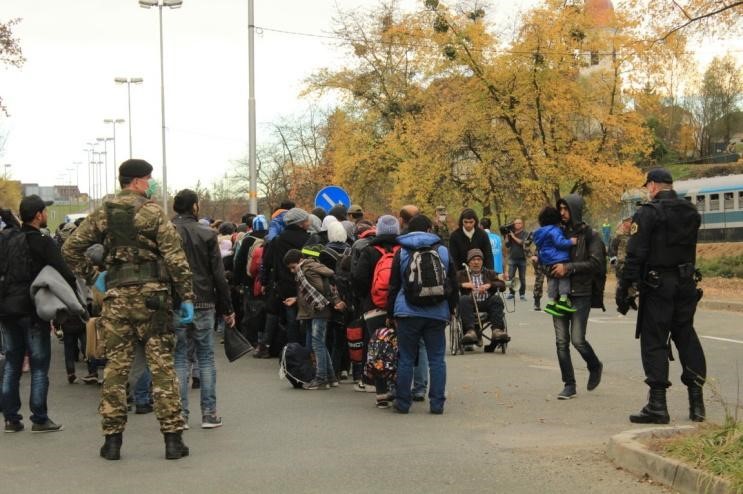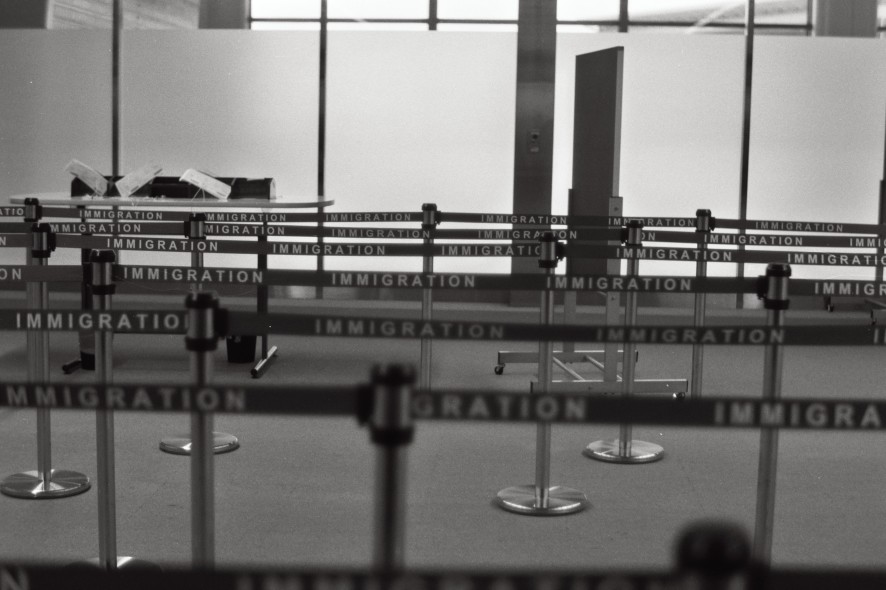On 20 March 2016, the siblings Javid and Nahid Raoufi and their friend Abdul Majid Rahimi arrived on the Greek island of Chios after having fled Afghanistan via Turkey. Upon arrival, they were detained in the so-called „Hotspot“ of Vial, an EU-initiated registration facility for asylum seekers converted into a detention centre. There, they had to endure abhorrent detention conditions: neither did they have access to medical care nor was the food sufficient or of acceptable quality. The sanitary conditions were appalling, with frequent cuts in water supply and extremely dirty toilets and showers.
Their story is not only one about personal suffering, but about the EU abandoning its commitment to human rights and international protection in the name of migration control. The day Mr and Ms Raoufi and Mr Rahimi reached Chios, the EU-Turkey statement of 18 March 2016, known as the EU-Turkey Deal, entered into force. It declares that any irregular migrant arriving on the Greek islands from Turkey will be sent back. This includes asylum seekers with inadmissible or unfounded claims. In exchange, the EU promised to resettle one Syrian from Turkey for every Syrian returned and to put in place a humanitarian scheme to take in more Syrian refugees from Turkey. The EU furthermore pledged to provide 6 billion € to support Syrian refugees in Turkey and to allow Turkish nationals visa-free entry into the Schengen Area. It is probably not very contentious to state that deporting asylum seekers to a country which hosts 3 million refugees, is mired in civil war and governed in an increasingly authoritarian fashion can hardly be considered a policy of providing international protection in a spirit of solidarity. What is more, the implementation of the deal raises serious questions as to its compliance with human rights and EU asylum law.
At Vial, Mr and Ms Raoufi and Mr Rahimi claimed asylum and on 19 April they filed a complaint with the European Court of Human Rights. They claim that they had not been informed of the reasons for their detention, that their detention was arbitrary and that they did not have access to legal aid or representation. Greek law allows for the detention of asylum seekers of up to 25 days with a possible extension of up to 3 months. The current policy appears to be to detain anybody arriving irregularly on the Greek Aegean islands for 25 days and then to release them with a restriction order, limiting freedom of movement to the island concerned, but the three claimants have been detained for longer. The complaint also alleges that the detention conditions at Vial amounted to inhuman and degrading treatment. The claimants’ reports in this regard have been confirmed by NGOs such as Human Rights Watch: In both the open and the detention sections of the “Hotspots”, extreme overcrowding forces people to sleep on the floor and in small tents. The hygienic conditions are extremely poor, with toilets overflowing and feces covering the surrounding floor. Medical care is either absent or insufficient and asylum seekers report frequent violent clashes and high levels of sexualized violence and harassment, which the Greek authorities did not provide protection against. Frequently, women, families and unaccompanied minors are not provided separate accommodation.
This state of affairs violates EU asylum law and the European Convention on Human Rights in multiple ways. Under the EU Reception Conditions Directive, detention of asylum seekers must be based on an individualized assessment. It may be applied only if a less coercive measure would not be adequate and if it is necessary and proportionate to achieve a legitimate aim. The policy to automatically detain all asylum seekers violates these requirements. Furthermore, both the EU Reception Conditions Directive and the European Convention on Human Rights require that detainees must be informed about the reasons of their detention and be granted the possibility to challenge its legality before a judge – this did not happen in the case of Mr and Ms Raoufi and Mr Rahimi. Unfortunately, this seems to be the norm rather than the exception.
Furthermore, the European Convention on Human Rights prohibits inhuman and degrading treatment; the EU Reception Conditions Directive grants asylum seekers an adequate standard of living which guarantees subsistence, protects mental and physical health and, in any event, covers basic needs. The European Court of Human Rights has repeatedly held that detention conditions in Greek detention facilities for asylum seekers amounted to inhuman and degrading treatment – the claimants had been detained in overcrowded facilities under appalling hygienic conditions, without access to showers or clean toilets. Judging by the complaint of Mr and Ms Raoufi and Mr Rahimi as well as NGO reports, EU funding and support have not prevented the same deplorable and illegal detention conditions from materializing in the „Hotspots“.
Besides the illegality of the detention practice, the plan to return asylum seekers whose application is declared inadmissible to Turkey raises serious legal issues. This part of the deal is applied via admissibility interviews on the basis of which the Greek Asylum Service determines if Turkey is a safe third country or a first country of asylum for the interviewed asylum seeker – the logic being that a person for whom this is the case can avail themself of protection in Turkey.
For a country to be a safe third country under the EU Asylum Procedures Directive, there may neither exist a risk of persecution nor of serious harm, e.g. through torture or armed conflict. Furthermore, there must be no risk of a further deportation to a situation where such risk exists and there has to exist the possibility to apply for refugee status and to receive protection in accordance with the Geneva Refugee Convention. For a country to constitute a first country of asylum, the applicant must have been granted refugee status or enjoy an otherwise „sufficient protection“ in that country. It seems logical to assume that the requirements for such sufficient protection should be as demanding as they are with regard to the safe third country standard.
As of 15 June, the Greek committees that decide on the appeals against inadmissibility decisions of asylum claims have denied that Turkey is a safe third country in 70 out of 72 cases. This is because there are NGO reports about mass expulsions of asylum seeking Iraqis and Syrians to their countries of origin from Turkey as well as about violent rejections of asylum seekers at the Turkish borders. Furthermore, the committees doubt that the temporary protection status which Syrian refugees are granted in Turkey amounts to protection in accordance with the Geneva Refugee Convention, as it is often only granted with unacceptable delays, does not allow for access to the labour market and is only of temporary nature. Non-Syrians can obtain a „conditional protection“ status – however, this hardly seems to be applied in practice. Against this backdrop, returns to Turkey cannot be considered safe, although the Turkish government has provided assurances that deported Syrians will be granted temporary protection and that other returned persons will be protected from deportation to a situation where their life or liberty would be at risk. The appeals decisions demonstrate that the Greek institutions are capable of providing an independent scrutiny of the deal’s implementation. But as they call into question the entire scheme, they also put the Greek administration under enormous political pressure to overcome this obstacle to a smooth execution of the deportations.
The EU Commission maintains its assessment that Turkey is a safe third country and that the temporary protection available to Syrians amounts to protection in accordance with the Geneva Refugee Convention. It welcomed a recent reform which changes the composition of the Greek appeals committees and scraps a second hearing before the appeals decision – ostensibly to speed up proceedings. Most commentators however fear that the recomposition of the committees will undermine their independence; in an open letter, members of the previous appeals committees accused the Greek Migration Ministry of recklessly trying to clear the way for mass deportations to Turkey.
Hence, the implementation of the EU-Turkey deal violates EU asylum law and the European Convention on Human Rights in multiple ways: with regard to the legality of the detention of asylum seekers in Greek „Hotspots“, the appalling detention conditions and the assumption that asylum seekers can safely be returned to Turkey. This has not hindered the deal’s implementation, although article 2 of the Treaty on European Union declares respect for human dignity, human rights and the rule of law to be amongst the EU’s founding values. The EU and its member states seem content to betray their values, as long as this brings down the arrivals of asylum seekers at their shores. It is people like Mr and Ms Raoufi and Mr Rahimi who bear the cost. Ms Raoufi reportedly intented to commit suicide twice since being detained.
Simon Rau also published this article already in March on the Mercator Blog: https://nefia.org/blogs/Simon-Rau/The-implementation-of-the-EU-Turkey-Deal-betrays-European-Values





